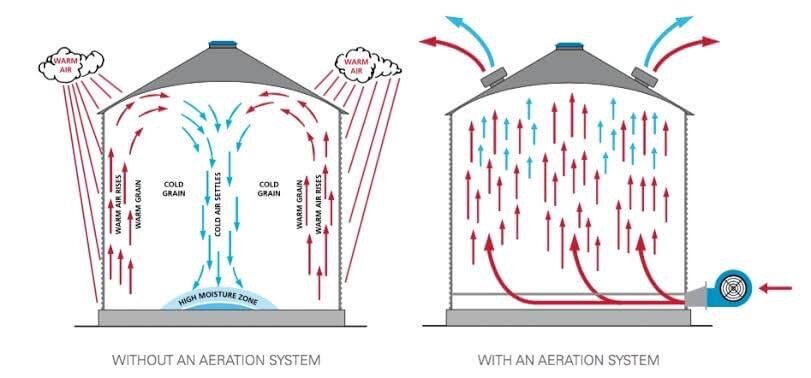Moisture migration in grain stores
Key to any successful grain farming venture is undoubtedly the ability to manage and store harvested grain in a way that will maximise its future return. The need for proper sealing and aeration systems has been explored in our Resources in the past, but in this article we’re going to look more closely at moisture migration.
What is moisture migration? And why does it happen?
Moisture migration occurs when the difference between the grain temperature and the outside air is the most extreme, typically during temperature fluctuations from one season to the next.
How does moisture migration occur?
The process of moisture migration begins when the outside air begins to heat the silo walls; heating the grain closest to the walls and causing a current of warm air to rise up the sides of the bin.
Any moisture throughout the stack will be picked up and carried upwards by the warm air, towards pockets of cooler grain and air in the centre of the bin. As the warm air meets the cool, it will release the moisture it picked up along the way, depositing it in the centre of the stack.
Impacts and damage caused by moisture migration
The major impact of having moisture move throughout a stack of stored grain is damage to the point of a reduction in quality of the stores. Moisture left untreated will inevitably lead to mould formation which can quickly damage grain.
Drying and cooling grain to prevent moisture
The easiest way to prevent moisture building up in grain stores and ensure grain quality is to ensure it is properly dried and cooled following harvest. As we harvest in hot and dry conditions - and grain is an excellent insulator - it will remain warm for some time. Aeration to cool and dry the grain before and during the season change will reduce the different in temperature between stores, and the air outside, significantly reducing the likelihood of condensation building up to create moisture.
The key takeaways here are simple; the successful management and regulation of temperature conditions and moisture build up within your bins will lead to more successful grain storage outcomes for your operation.
If you would like advice on moisture migration, aeration, or have any other issues or questions regarding effective grain storage or handling, you can email or call our experienced team right now on 0427 663 777, or joel@optimumsilos.com.au.

